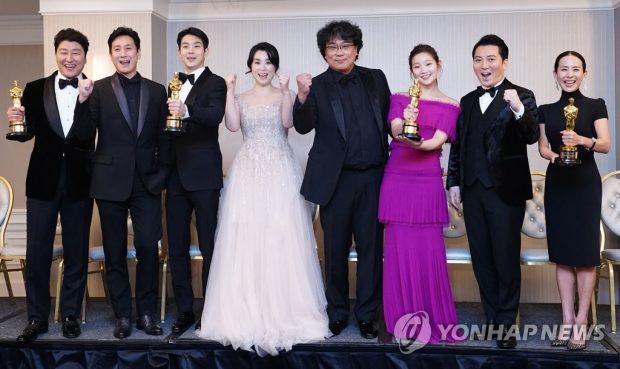Bong joon-ho wins Oscar

Director Bong Joon-ho (4th from R) and cast members of “Parasite” pose during a press conference at London West Hollywood in Los Angeles on Feb. 9, 2020 (local time), after the movie took four titles at the 92nd annual Academy Awards. (Yonhap)
By Ivan Lim
Former AJA President
Contributor to AsiaN
Singapore: Bong Joon-ho’s historic feats in winning Oscars for Best Original Screenplay, Best Director and Best Picture for his Korean-language socio-drama Parasite has given surrealistically a feel of paradise.!
A tale of two families – the Kims and the Parks. They are living in worlds apart.
A family of four, the Kims stay in a semi-basement in an impoverished neighbourhood while the Parks’ dwelling is a lush mansion with a spacious garden compound.
The social divide, a facet of Korean society, is a normal state of affairs, as reflected in the way the Kims tolerated the parasitic bugs and the fumigation fumes engulfing their home. As well, they could do nothing about the stranger who urinated outside. To be sure they complained a lot when their internet access was cut off because the bill was unpaid, itself a mirror of their meagre means in the modernistic hi-tech world.
Such a contrast to the wealthy Parks with chauffeur and house-maid at their beck and call. Nothing would have happened as the Kims and Parks go about their own business in this human. drama except that director Bong Joon-ho, in his social conscience decided it must not remain static. He contrived, as it were, to let their worlds collide and their fates change – for better or worst.
The agent of change is the Kim’s scion, the English-speaking Ki-ho, who enters the Park’s universe posing as a language tutor to their daughter. As the story unfolds, Ki-ho begins to entertain ideas of keeping up with Parks.
Superimposed on the larger Asia scenario, this is the perpetual catching up with the rich class by the poor. The United Nations speak in terms of development economics to achieve the Millennium Development Goals of reducing poverty and inequality.
In the family drama, Director Bong allows Kim Ho’s father to dream of an easy route to riches if his tutor son marries the Park daughter. A time-honoured practice among Asian tycoons; albeit works usually between compatible families.
Not so in this case. The Parks could not stand the different ‘smell’ of the Kims members. Socially a different breed, if physically, they had gone through a sewage flood.
The Park patriarch has also to put his Kim counterpart in place when the latter became too familiar. “I pay your salary,” tells the now-family driver. The personal offence and acrimony lead to tragedy.
To be sure, the filial and ambitious Ki-ho is not merely think of the easy way to riches but realises that it would take him as long as five generations to be able to own a house like the Parks. Symbolically, he has been gifted a scholar’s stone. Therein lies Director Bong’s moral of his story: It will be a long-haul effort to level the playing field.
Or perhaps, his message is for the Ki-hos of Asia to move up the ranks via the educational ladder, not by parasitic steps





















































